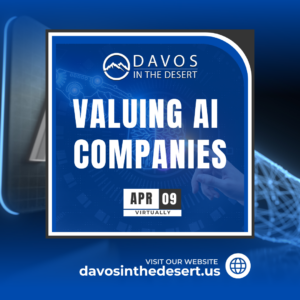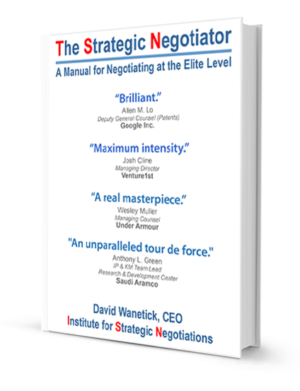Emerging Disruptors in Valuing AI
Worldwide – Virtually
April 9, 2025
 Trillions of dollars are being invested in AI companies. But no one seems to have any idea how to value the AI companies they are investing in. Even AI offers no guidance for self-referential valuation parameters. That doesn’t compute.
Trillions of dollars are being invested in AI companies. But no one seems to have any idea how to value the AI companies they are investing in. Even AI offers no guidance for self-referential valuation parameters. That doesn’t compute.
Fortunately, Davos in the Desert is standing up and running a program to provide ideas and discussion relative to valuing AI. No one else is running a program even remotely similar or important.
Don’t miss this unique opportunity to gain insight into approaching one of the seminal questions of the day: What are AI companies worth?
Register soon. Half of our online capacity is reserved for Davos in the Desert members.
Trying to estimate the size of the AI industry risks missing AI’s bigger impact. AI is rapidly becoming embedded in many industries and in many aspects of our daily lives. AI is changing the way we consume news and schedule our daily affairs. AI is making logistics more efficient and enabling citizens to better navigate medical and government bureaucracies. AI optimizes the amount of water each plant receives and helps radiologists better read bone scans.
AI is a massive economic driver and a ferocious threat to large swaths of the white-collar community. Even back in 2022, 35% of companies used AI, while another 42% were exploring it. As a result, 24% of workers fear AI will render their jobs obsolete soon.
The global AI market is experiencing rapid growth. In 2024, the AI market was estimated to be between $196.6 billion and $233.5 billion. Forecasts call for the AI market to reach somewhere between $1.3 trillion to $1.8 trillion by 2030.
If he was now with us, Winston Churchill might say that valuing AI companies is a riddle: wrapped in a mystery; inside an enigma. David Wanetick, CEO of Davos in the Desert, says that valuing AI companies isn’t rocket science. It’s much more difficult than that.
The following are among the considerations and methodologies that could be called upon when valuing AI companies:
| Inference vs. Distillation | Legal Straightjackets |
| Open-Source v. Closed Loop | FOMO |
| First Chicago Valuation Method | Impact of Export Restrictions |
| Las Vegas Conundrum | Rules Based Industries |
| Rule of 40 | Binomial Lattices |
| Javens Paradox | Mixture of Experts |
| Product Proliferation | Cash Burn |
| Competition from Customers | Icarus Paradox |
| Liability for AI Misfiring | Acqui-hires |
| Vesting Schedules and Cliffs | Bigger Fool Fallacy |
| Cost of Computing | Fermi Method |
The release of DeepSeek caused a $1 trillion bloodbath in U.S. equity markets. Was the January 20 launch coincidental with President Trump’s inauguration? Or does the debut represent a geopolitical shot across the bow?
Is DeepSeek really as good at answering questions and reasoning as ChatGPT, Gemini and Claude? Whatever the case, DeepSeek is causing the AI ecosystem to contemplate issues such as:
● Did it really cost $5.6 million only to develop DeepSeek?
● Did DeepSeek receive support from the Chinese government?
● Did DeekSeek really only rely on inexperienced programmers to create its AI?
● How did DeepSeek design around (or work around) advanced chip export restrictions?
● What will be the impact of DeepSeek on data center build out?
● What other AI breakthroughs might come out of the woodwork?
There is a tsunami of money flowing into the AI industry. Below are a few of the deals that recently transpired (or were expected to take place):
● OpenAI has been in discussions to raise up to $40 billion, potentially valuing the company at $300 billion.
● Databricks raised $10 billion at a $62 billion valuation.
● Anthropic entered into advanced discussions to raise $2 billion, potentially pushing its valuation to $60 billion.
● Perplexity AI closed a $500 million funding round, increasing its valuation to $9 billion.
● Google agreed to a $2 billion licensing fee for Character.AI’s technology.
● Amazon agreed to pay $330 million to license Adept AI’s technology.
● Microsoft paid around $650 million to license Inflection’s technology.
A few select AI companies will be invited to make elevator pitches. These CEOs are likely to discuss their firms’ addressable markets, AI architecture, engineering/programming talent, go-to-market strategy, electricity costs, capital raising record; collaborations and more.
The presenting management teams will discuss how their companies are positioned to detect deepfakes. They will apprise listeners of their unique product offerings, key selling points and their targeted customer segments. They will inform us of their research and development efforts, proprietary technologies, trade secrets and patent portfolios. They will tell us about their business models including the extent of their collaborations, marketing strategies, distribution channels, expansion efforts, customer acquisition strategies, milestones and exit strategies.
Note: All Times Pacific
8:10 am – Welcome
8:15 am – AI Valuation Multiples – Drivers and Trends
This session will provide a thorough overview of recent trends in funding AI companies. You will learn about the numbers of AI companies receiving funding at various rounds in recent years. You will gain insight into the check sizes and valuations of such funding rounds. You will get a review of which investors have been most active in the AI space. The implied multiples resulting from such funding will also be discussed. Thoughts about AI valuations will be shared regarding important issues such as DeepSeek, investor expectations for portfolio companies to become cash flow positive and the costs of testing datasets.
Speaker: Shaheer Ansari, Analyst, Aventis Advisors
8:30 am – AI Scaling Laws
Learn how to project inference training times and AI release dates based on issues such as the speed with which chips can be acquired and installed as well as the chip years deployed. Gain insight into how Open Source AI affects the diffusion of AI models and algorithms. Gauge the impact that DeepSeek may have on AI deployments and business models. Unique insight will also be shared concerning AI moats and Jevon’s Paradox.
Speaker: Brian Wang, Futurist Thought Leader, Nextbigfuture.com
9:15 am – What Venture Capitals Seek When Investing in AI Companies
Learn what drives venture capital investment in emerging AI companies. Which verticals are most attractive to VCs? How is the quality of the talent assessed? How important is access to inexpensive electricity? To what extent does addressable market size excite VCs? What deal structuring techniques do VCs use to keep management teams focused? How can VCs make rational investment decisions in view of fierce competition for deals?
Panelists: Steven Bernardez, Partner, Pegasus Tech Ventures
Keith Camhi, Managing Director, Techstars
10:00 am – Coffee Break
10:15 am – Decoding DeepSeek’s Impact on the Global AI Market
When the release of a new technology causes a $1 trillion bloodbath in U.S. equity markets, it makes sense to understand the long-term impact of such technology. This session will cover crucial issues related to DeepSeek such as:
- Was the January 20 launch of this Chinese AI technology coincidental with President Trump’s inauguration?
- Is DeepSeek really as good at answering questions and reasoning as ChatGPT, Gemini and Claude?
- Who is banning DeepSeek and why?
- Did it really cost only $5.6 million to develop DeepSeek?
- Did DeepSeek receive support from the Chinese government?
- Did DeekSeek really only rely on inexperienced programmers to create its AI?
- How did DeepSeek design around (or work around) advanced chip export restrictions?
- What will be the impact of DeepSeek on data center build out?
- What other AI breakthroughs might come out of the woodwork?
- How vulnerable is DeepSeek to jailbreaking?
- What damage can bad actors perpetrate through DeepSeek?
- How might DeepSeek infringe on users’ privacy?
Speaker: Anders Corr, Principal, Corr Analytics
11:00 am – The Impact of Employment Law on the Diffusion of AI
What steps should employers take to ensure that AI doesn’t result in substantially lower selection rates for protected groups of people? To what extent do labor laws and union agreements increase the difficulty of terminating employees made redundant by AI? What are the risks of AI violating employee privacy rights?
Speaker: Jonathan Ben-Asher, Founding Member, Ritz Clark & Ben-Asher LLP
Robert Szyba, Partner, Seyfarth Shaw
11:45 pm – The Intersection of AI and Intellectual Property Law
To what extent is AI code patentable? Which obviousness challenges do AI patent applications face? Is it better to retain key AI code as trade secrets? What role should AI play in preparing freedom to operate opinions? How can AI assist in drafting patents for congruency with relevant regulations and standards? Can AI-generated inventions be patented? What kind of remedies could be imposed on AI companies that violate copyright-protected materials? Where is the boundary between AI infringement and fair use? Which challenges arise when seeking to license AI code? What complexities does open-source pose to monetizing AI?
Speaker: Kevin Buckley, J.D., Founder & Senior US Patent Attorney, Torrey Pines Law Group
12:30 pm – Valuation of AI Companies
The following are among the considerations and methodologies for valuing AI companies that may be discussed:
| Inference vs. Distillation | Legal Straightjackets |
| Open-Source v. Closed Loop | FOMO |
| First Chicago Valuation Method | Impact of Export Restrictions |
| Las Vegas Conundrum | Rules Based Industries |
| Rule of 40 | Binomial Lattices |
| Javens Paradox | Mixture of Experts |
| Product Proliferation | Cash Burn |
| Competition from Customers | Icarus Paradox |
| Liability for AI Misfiring | Acqui-hires |
| Vesting Schedules and Cliffs | Bigger Fool Fallacy |
| Cost of Computing | Fermi Method |
Speaker: David Wanetick, CEO, Certified Patent Valuation Analyst and Managing Director at Merit Investment Bank
1:15 pm – Adjournment
Please check back for updates to our agenda. If you would like to nominate a subject matter expert to speak or a CEO to deliver a company elevator pitch, please contact David Wanetick at dwanetick@davosinthedesert.us.
Registration is free for members of Davos in the Desert (annual members only), Certified Patent Valuation Analysts in good standing, and professionals who have purchased The Strategic Negotiator: A Manual for Negotiating at the Elite Level (see below right). Half of our capacity is reserved for these professionals.
The early-bird registration price for non-members is just $45. Registration is for one attendee. No passing on of registration links. (That results in automatic expulsion from online programs.) No refunds.
Need help registering? Send an email to Neomi Barazani at neomi@davosinthedesert.us.
|
Loading…
|
The Seminar Leader’s 800-Page Negotiation Book
The Strategic Negotiator bursts with actionable and practical advice for negotiators. Powerful lessons are drawn from history and diplomacy. Negotiations come alive in these pages as colorful vignettes from the worlds of commerce; investment, music and entertainment are shared. Original negotiating gambits — such as the Moonwalk, the Circular Saw, the Velvet Crowbar, Shakedown Disinfectants, and the Advanced Eulogy — are introduced. The intricacies of negotiating around specific contractual terms are expounded upon: Insights into Auctions, Exclusive Negotiating Periods, 360° Contracts, Liquidation Preferences, Bilateral Options, Wedges, Escrows, Entry of Competitor Provisions and Most-Favored Nation Clauses await the reader. Specific strategies for outflanking regulators, bullies, frenemies, bosses, and venture capitalists are provided. |

